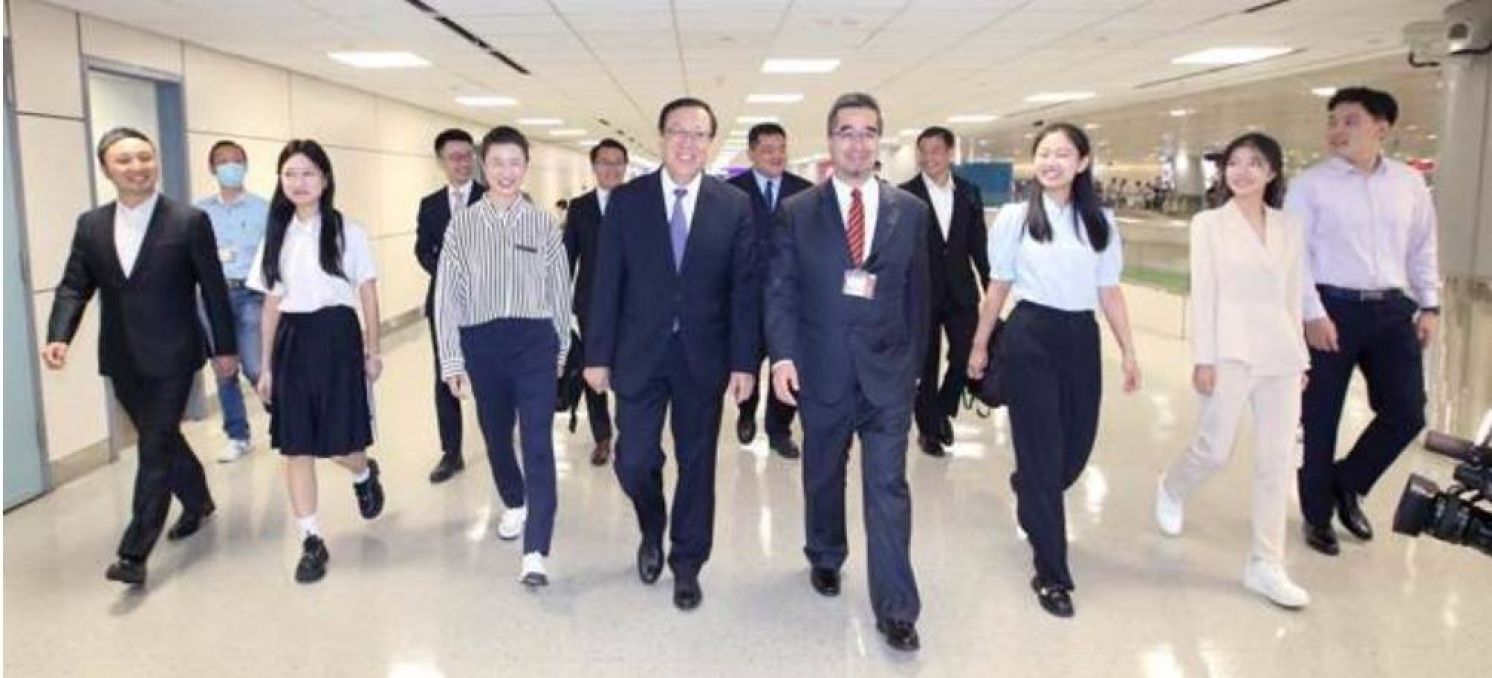
Mainland Chinese Student Delegation Not United Force Campaign: Restore Goodwill in the Taiwan Strait
China Times Editorial, November 27, 2024
A group of 40 mainland Chinese students and teachers, invited by the Ma Ying-jeou Foundation, arrived in Taiwan. Before their departure, anonymous officials leaked their names and positions to specific media, claiming that all members were selected by Communist China and included Communist Youth League members, reserve party members, or party members. They even noted that Olympic table tennis champion Ma Long was among Communist Party members. Some pro-DPP scholars labeled the visit as propaganda and unification efforts. This visit, which initially went smoothly compared to last year's, was marred by political maneuvering before departure, which is both regrettable and worrying.
Mainland China's long-standing "two-handed strategy" towards Taiwan uses a combination of hard and soft tactics—crushing the Democratic Progressive Party (DPP) and pro-independence forces while appealing to the Taiwanese people. The DPP administration has repeatedly opposed this approach, claiming it divides Taiwan and hinders cross-strait exchanges. Yet, while approving the mainland delegation's visit through an interagency review, the government simultaneously leaked the members' political affiliations, raising concerns over legal violations and data leaks. Isn't this also a "two-handed strategy"?
By using its own two-handed tactics in response to Beijing's, the DPP may seem to be offering a "tit-for-tat" reaction, but it ultimately undermines its moral high ground. This move confirms the government's hollow rhetoric about supporting healthy and orderly cross-strait exchanges, severely damaging mutual trust between the two sides. Typically, the government has access to information about the political affiliations of mainland visitors through the forms submitted by the mainland. In the past, Taiwan’s government has rejected mainland visitors for "concealing party affiliations."
In other words, if mainland Chinese individuals truthfully declare their party affiliations, it should be seen as a pragmatic respect for Taiwan's governance. However, it was turned into a tool for manipulation by Taiwanese officials, who sought to avoid responsibility through anonymous leaks. Such petty moves, as Ma Ying-jeou Foundation Executive Director Hsiao Hsu-tzen put it, are "a shame for Taiwan." This not only puts government agencies such as the Mainland Affairs Council, the Ministry of Education, and the National Immigration Agency in an awkward position, having facilitated the visit's approval, but it also betrays Taiwan's "mocking" approach towards mainland China. It suggests that this leak may have been a warning from the "anti-exchange" faction within the administration of President Lai Ching-te, silencing those within the party and government who favor exchanges.
In fact, the anonymous senior official in the Lai administration who focused on the delegation’s party affiliations is following a similar logic to the recent political maneuvering by the pro-DPP camp over Andy Lau's performance of the song Chinese People " in Taipei, and his position as vice president of the China Film Association. According to official data from China, as of last year, there were 74 million members of the Communist Youth League, with 290 million students in China. This means one out of every four mainland students is a member of the Youth League. For example, at Tsinghua University in Beijing, which led this visit, there are 76,000 faculty and students, with 28,000 party members—one-third of the total. When the pro-DPP camp tried to politicize Andy Lau’s actions regarding unification, it was ridiculed, and now they attempt to use student party members to play the "anti-China" card. Public opinion will likely not support such tactics.
More importantly, the DPP’s labeling of mainland students and teachers as part of a "united front" not only complicates cross-strait youth exchanges but also reflects a misjudgment of Beijing's intentions towards Taiwan. During the pandemic in 2020, Beijing suspended mainland degree-seeking students from coming to Taiwan, and exchange programs were also halted. After the pandemic, exchange student visits gradually resumed, but the approval for degree-seeking students remained uncertain. Initially, the main obstacle was the issue of health insurance, which the DPP administration has now allowed, but the key issue still lies in cross-strait political matters. Now, with the Ma Ying-jeou Foundation organizing youth exchanges as a “stepping stone” to foster positive civil exchanges, there is an opportunity to lift the ban on mainland degree students coming to study in Taiwan.
It is believed that many within the DPP who wish to restore cross-strait exchanges and improve relations have seen this as an opening, which is one of the reasons the Ma Ying-jeou Foundation’s invitation for the mainland student delegation was successfully approved. Some DPP legislators like Shen Po-yang expressed concerns that this visit was part of a united front strategy. Fortunately, the Mainland Affairs Council did not follow suit and emphasized that there were no national security concerns, welcoming the exchange. The 40 young mainland elites, including Ma Long, visiting Taiwan may seem like a small-scale exchange, but it is intended to pave the way for larger exchanges. Just as Beijing and Washington’s relationship thawed through civil and sports exchanges, any hope for a broader resumption of cross-strait exchanges should be welcomed, not hindered. Those who try to obstruct such progress expose their malicious intent of wanting "less communication" between the two sides.
The most beautiful sight in Taiwan is its people. If Ma Long, Yang Qian, and other mainland students and teachers visiting Taiwan can experience Taiwan’s rich hospitality and its deep Chinese cultural heritage, it would help them, as Communist Party members and young cadres, gain a deeper appreciation for peace across the Taiwan Strait. The Lai administration should extend proper hospitality, respect, and courtesy to the mainland delegation, allowing cross-strait exchanges to form a cycle of goodwill.
From: https://www.chinatimes.com/opinion/20241127004649-262101?chdtv